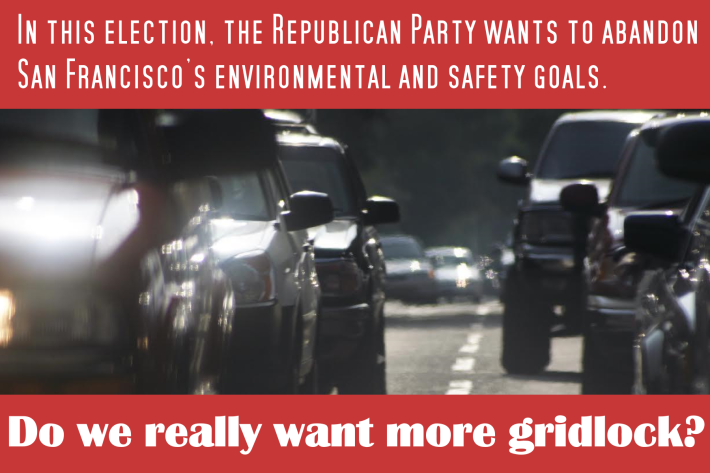
Yesterday, the Los Angeles Times published the editorial Sharing the Roads in L.A. Ultimately the Times favors moving patiently toward a vision that "puts pedestrians, cyclists and transit users on equal ground with drivers," but some of the Times preamble undermines its welcome conclusion.
The start of the editorial quotes the proponents of San Francisco's Proposition L, a Republican-funded regressive measure that calls for prioritizing cars and enshrining free parking. L's deceptive rhetoric is to "Restore Transportation Balance" which seems to be code for "Let Us People in Cars Have All the Space Like in the Good Old Days."
The Times editorial only gives voice to Proposition L supporters, ignoring its many detractors. Prop L is opposed by a broad range of S.F. political leaders. Critics warn that L's policies will worsen gridlock, harm affordability, and degrade the environment.
From the Times editorial, quoting Proposition L's backers:
Because 79 percent of [S.F.] households in the city have a car, proponents argue, wouldn't it make more sense to dedicate more money to helping cars move faster and making it easier and cheaper to park them? Why have local transportation authorities created a “war on motorists” by removing street parking and traffic lanes for bike routes, while hiking meter rates and parking ticket fines? Enough already!
Maybe the Times only had print space for one side of this issue, so I'll be helpful and feature some of the other side's rebuttals. Here is Streetsblog San Francisco's take on that 79 percent number:
This [statistic] is a misleading and hyperbolic way to misrepresent policies aimed at giving San Franciscans better alternatives to owning cars. Another way to look at car ownership stats: 37.1 percent of households own only one car, so 58 percent of households own one or zero cars. Despite having a solid car-light majority, San Francisco already devotes most of its street space to moving and parking cars — mostly for free.
And how about that "war on motorists"? If the situation we face today is some kind of war on motorists, I am looking forward to the war on cyclists, pedestrians, and transit-riders. The one where we get all kinds of "free" stuff subsidized by other taxpayers, billion-dollar capital projects, space everywhere, etc. If anyone you know, editorial writers included, trots out phrases like "war on cars" show them these charts from Streetsblog New York City and Streetsblog Los Angeles.
Like some other recent Times editorials, yesterday's seems to speak with multiple voices. This multiplicity of viewpoints is fitting, as it is reminiscent of L.A.'s streets. Cars, buses, shuttles, taxis, trains, bikes, feet, wheelchairs, and much more - all come together and share space on L.A. streets all day every day. Striking a safe, healthy balance that supports a world class city requires a dance, a dialogue, a negotiation.
As new LADOT general manager Seleta Reynolds often points out: it's all people out there using our streets, so it can be unhelpful rhetoric to categorize everyone into neat stereotypes including: drivers, cyclists, and pedestrians. When drivers park, they become pedestrians. Many cyclists become drivers when we carry lots of groceries. Reynolds also points out that drivers benefit from greater road safety and parking reform, and that many complete streets projects can reduce congestion.
Like the Times, I would favor "a consensus-building process" that leads to "a record of success" in streets that are great for all. I don't remember a lot of Times editorials pushing for patient public consensus when many backroom processes were delivering car culture to our doorsteps, but, nonetheless: yes, today as ever, community consensus is important. Unfortunately, I think that the Times is holding Los Angeles to an impossible standard if it thinks that "even die-hard drivers" can be won over. Sometimes, a few vocal critics is a sign that we're getting somewhere. Sometimes, a greater good, like, say ending traffic deaths by 2025, means that a few die-hard people, like, say, Proposition L proponents, don't always hold sway over what is good for everyone.





